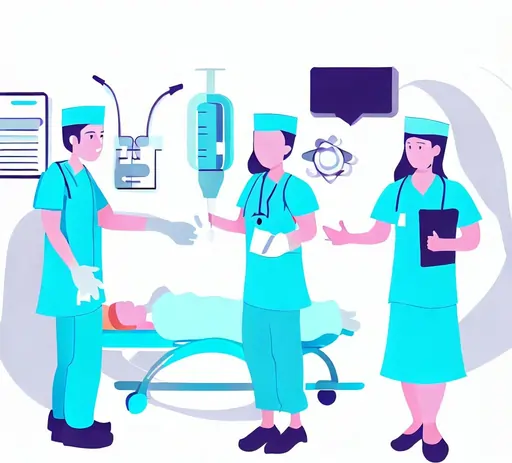The Importance of Simulation Training in Nursing Education

In the dynamic world of healthcare, nurses play a crucial role in delivering quality patient care. To prepare future nurses for the challenges they'll face in the field, nursing education has evolved significantly over the years. One of the most impactful innovations in nursing education is the integration of simulation training. In this blog post, we will delve into the importance of simulation training in nursing education, focusing on Simulation in Nursing Education. Moreover, we will guide students on how to complete their nursing assignment related to this topic.
The Evolution of Nursing Education
Nursing education has transformed from traditional didactic methods to a more interactive and experiential approach. Simulation in nursing education is a direct response to the need for nurses to acquire practical skills, problem-solving abilities, and critical thinking in a controlled, risk-free environment.
Simulation in Nursing Education

Simulation in nursing education involves replicating real-life clinical scenarios using high-tech manikins, computer programs, and other educational tools. This technique allows nursing students to develop clinical skills, decision-making abilities, and confidence in a safe and controlled environment. Here are some key aspects of simulation training in nursing education:
- Realistic Scenario Replication: Simulations aim to mimic actual patient-care situations, such as administering medication, responding to emergencies, or conducting physical assessments. This realism helps students bridge the gap between theory and practice.
- Safe Learning Environment: Simulation offers a risk-free setting where students can make mistakes and learn from them without endangering patient lives. It promotes a culture of patient safety and quality care.
- Enhanced Critical Thinking: Nursing students must think critically and make quick decisions in high-pressure situations. Simulation exercises challenge them to apply their knowledge, prioritize tasks, and adapt to changing circumstances.
- Teamwork and Communication: Nursing is a collaborative profession, and effective teamwork and communication are essential. Simulation scenarios often involve group activities, fostering teamwork skills and interprofessional collaboration.
- Immediate Feedback: Instructors can provide immediate feedback to students, helping them identify areas for improvement and reinforcing correct practices.
The Benefits of Simulation Training
Now that we understand what simulation training in nursing education entails, let's explore the significant benefits it offers:
Improved Clinical Competence:
Simulation training provides nursing students with a platform to repeatedly practice and refine their clinical skills and procedures. This repetitive practice is crucial for achieving mastery in healthcare practices. Here's why improved clinical competence is so significant:
- Skill Mastery: Through simulation, students can practice procedures like administering medications, wound care, and patient assessments until they can perform them accurately and confidently.
- Realistic Scenarios: Simulated scenarios closely mimic real clinical situations, allowing students to apply their knowledge and skills in context.
- Error Correction: Any errors made during simulations can be identified and corrected immediately, ensuring that students understand the correct procedures thoroughly.
- Confidence Boost: As students gain competence in these skills, their confidence levels increase, making them better prepared for real-life patient care.
Confidence Building:
Confidence is a vital attribute for nurses when delivering patient care. Simulation plays a crucial role in building and boosting students' confidence in several ways:
- Success Stories: Successful completion of simulation scenarios reinforces students' belief in their abilities.
- Exposure to Diverse Cases: Simulations expose students to a wide range of clinical cases, ensuring they are more confident in handling various patient situations.
- Safe Environment: The controlled environment of simulation offers a safe space for students to build their confidence without the fear of harming real patients.
- Repetition: Repeated practice of skills and scenarios in simulations helps students become more proficient, contributing to their overall confidence.
Risk Mitigation:
The healthcare field demands high levels of precision and accuracy, which leaves little room for error. Simulation training is a valuable tool for mitigating risks associated with medical errors:
- Error Learning: Simulation allows students to make mistakes without any real-life consequences. These errors serve as invaluable learning experiences.
- Safe Failure: In a simulation, a "failed" scenario is a learning opportunity rather than a potentially harmful event.
- Quality Patient Care: By reducing the potential for medical errors in practice, simulation indirectly contributes to safer patient care environments.
Enhanced Problem-Solving Skills:
Nursing is not just about following established procedures; it also requires the ability to think critically and adapt to ever-changing patient conditions. Simulation enhances problem-solving skills by:
- Complex Scenarios: Simulated scenarios often involve intricate patient situations that demand creative thinking and quick decision-making.
- Adaptation: Students must adapt to unexpected changes during simulations, which hone their ability to handle unforeseen challenges.
- Interdisciplinary Collaboration: Many simulations involve teamwork with other healthcare professionals, fostering effective communication and collaborative problem-solving.
Better Patient Outcomes:
Ultimately, the goal of nursing education is to produce competent and proficient nurses who positively impact patient care outcomes. Nurses trained with simulation techniques tend to achieve better patient outcomes for several reasons:
- Competence and Confidence: Simulation equips nurses with both the competence and confidence to provide high-quality care.
- Error Reduction: By learning from mistakes in simulations, nurses are less likely to make critical errors when caring for real patients.
- Quick Decision-Making: Improved problem-solving skills and the ability to think on their feet enable nurses to respond swiftly to patient needs.
- Evidence-Based Practice: Simulation often incorporates evidence-based practices, ensuring that nurses are up-to-date on the latest healthcare protocols.
Approaching Assignments on Simulation in Nursing Education
As a nursing student, you might encounter assignments related to simulation in nursing education. Here are some tips to help you excel in these assignments:
- Understand the Basics: Start by comprehending the fundamental concepts of simulation in nursing education, including its purpose, benefits, and various simulation modalities.
- Research: Conduct in-depth research on the specific topic or scenario provided in your assignment. Explore academic journals, textbooks, and reputable websites to gather information.
- Case Study Analysis: If your assignment involves analyzing a simulated case study, pay close attention to the details, patient history, and potential nursing interventions. Use your critical thinking skills to develop a care plan.
- Reflect on Personal Experience: If you've participated in simulation exercises as part of your coursework, reflect on your experiences and how they relate to the assignment's topic.
- Connect to Real Practice: Relate the concepts from your assignment to real-life nursing practice. Discuss how simulation training can benefit healthcare outcomes.
- Cite Credible Sources: Ensure that you cite credible sources in your assignment to support your arguments and provide evidence for your statements.
- Seek Help if Needed: Don't hesitate to seek assistance from your instructors, peers, or online resources if you encounter challenges while working on your assignment.
Conclusion
Simulation training in nursing education is a powerful tool that equips nursing students with the skills and confidence needed for successful clinical practice. As the field of nursing continues to evolve, students need to grasp the significance of simulation in their education. When approaching assignments related to this topic, remember to draw connections between theory and practice, research thoroughly, and seek assistance when necessary. By doing so, you will not only excel in your assignments but also become a more competent and confident nurse, ready to make a meaningful impact on patient care.